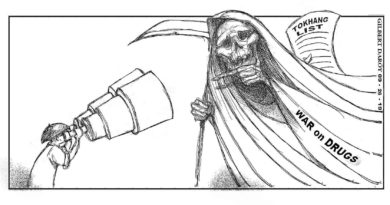OP-ED: Mental health must not be ignored
The Straits Times says

Mental health must not be ignored
.
The physical ramifications of Covid-19 are manifest in the number of confirmed cases and deaths. However, the pandemic and the measures necessary to contain it are making their presence felt in the mental field as well. This is not unusual, whether globally or in Singapore. Humans necessarily are creatures of habit. When the predictability formed by personal and social habits is disrupted suddenly and rudely, in this instance by the onset of a viral disease for which there is no treatment yet, the temporary disappearance of a familiar world cannot but have an effect on the mind. Globally, there has been a surge in the number of calls to mental health hotlines. Especially in economically advanced countries, the breakdown in personal expectations and social communication exacts a marked price on citizens accustomed to prosperity and order. Covid-19 poses a threat to that entire fabric.
.
In Singapore, circuit breaker measures are accepted widely by the public as being critical to stop the spread of Covid-19. Yet, prolonged measures could have an impact on mental health. That impact includes the psychological effects that come with social isolation, boredom and family tensions. There are concerns over an increase in cases of depression among people over the medium to long term if there is a prolonged recession. Another area of concern is family violence caused by enforced proximity to a hostile partner. Children would be vulnerable particularly to distress which feeds the inherent insecurities of growing up in dysfunctional homes.
.
It is reassuring, however, that many organisations here are trying to meet the psychological fallout of the epidemiological and economic crisis. The National Care Hotline, the Institute of Mental Health’s Mental Health Helpline, the Samaritans of Singapore, Silver Ribbon Singapore and Tinkle Friend are among them. Their work includes assuring those affected that no one is alone in this pandemic; that Singaporeans understand collectively the special problems that many are going through individually – and that there is always someone to turn to in difficult times.
.
Psychological questions exist even beyond the circuit breaker period. Working from home and practising social distancing have come at a price, and this could also have an effect on people when they gradually return to work and to former social practices. Internationally, experts warn of a waning of personal confidence because of the experience of isolation during a lockdown. Meetings held face to face at work, which used to be the norm earlier, paradoxically might prove difficult for those with mental health problems. It is important for people to prepare for that return. While the economic outlook is cloudy enough, its social effects would be exacerbated by mental health issues complicating work and social relations.
.












